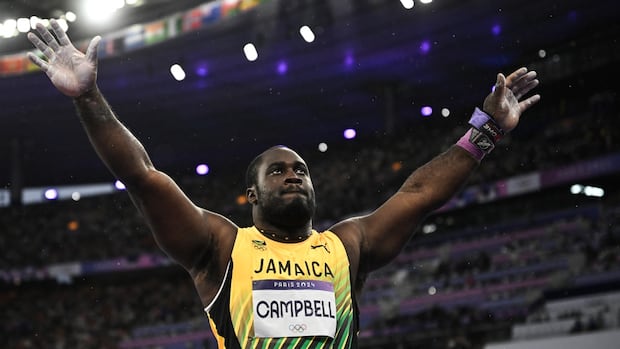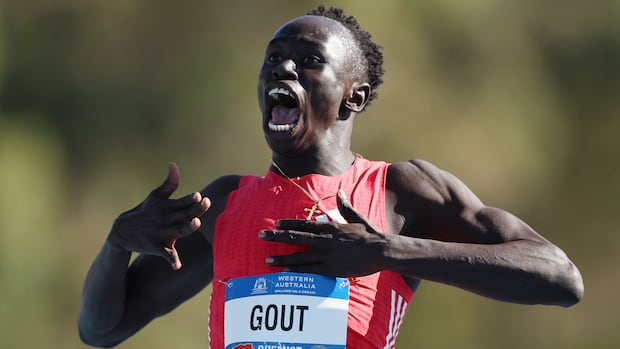[
Last week Turkey’s athletics federation undertook a seismic spending spree, rattling international track and field right down to its foundations.
Two Jamaican throwers, Rojé Stona and Rajindra Campbell; two Jamaican jumpers, Wayne Pinnock and Jaydon Hibbert; and one Nigerian sprinter, Commonwealth Games silver medallist Favour Ofili, all agreed to become, for the purposes of international competition, Turkish. Immediately, pending final sign-off from World Athletics. Each athlete will reportedly receive a $500,000 US signing bonus, plus a monthly allowance.
We’re used to international transfers in track and field, usually one-offs that happen for personal or political reasons. American-born Andrew Hudson runs for Jamaica because his parents are from the island. Pablo Pedro Pichardo jumps for Portugal because he defected from his native Cuba.
But the scale of Turkey’s current campaign is unprecedented. Five elite performers, in their prime years, switching countries in the same week. It’s difficult to come up with a label for a move that bold, but here’s a start:
It’s a bargain.
Consider the $2.5 million (all figures US) a down payment on short-term success, and the monthly stipend a modest ongoing cost. In return, Turkey fields medal contenders in five events, maybe as soon as this September at the World Athletics Championships in Tokyo. The deal doesn’t provide the kind of depth traditional track and field powers have, but it proves you can buy top-end talent.
WATCH | Why are foreign athletes transferring to Turkey?:
Hosts Perdita Felicien and Aaron Brown are joined by Ricardo Chambers, Jamaican sports journalist, to explain why some of the country’s field athletes are switching allegiance to Turkey, and which athletes could follow suit.
Cheaply, by the standards of pro sports. I don’t know what $2.5 million gets you in the NBA, but I know what it doesn’t get you: Any closer to the final.
If any member of this recruiting class makes the top eight in September, Turkey will have broken even on a modest investment. Each podium finish is a windfall.
So track and field isn’t just the jewel of the Olympic program every four years, a place to build attributes team sports treasure, or a sports marketing afterthought hoping a Netflix series can keep it on mainstream fans’ minds. It’s also a market inefficiency that sports power brokers in Turkey hope to exploit, the straightest path to prominence for a federation willing to invest in scouting and talent procurement.
Maybe swapping cash for national allegiance seems crass but last week’s transactions are honest in their own way, and provide a clear picture of the current state of the sports industry. In a triple-threat match between sport, business, and patriotism, business wins out, almost every time.
If you don’t like the idea that top-tier athletes can or will compete for the country that cuts the biggest cheque, you might want to blame somebody. It makes sense, but understand this: the buck doesn’t even pause with the athletes.
These folks, after all, are elite performers in a sport where guaranteed money is scarce. Contracts with shoe manufactures are famously riddled with conditions and reduction clauses, and exit ramps for the company. A handful of stars command the most lucrative shoe deals, and the fattest appearance fees at track meets, and that setup leaves hundreds of world class athletes hustling over whatever’s left.

Male sprinters, especially if they’re North American, can always try to monetize their speed on the gridiron. A 10.15-second 100-metre runner might not make the top 24 at the Olympics, but in the NFL he’s fast enough to warp time. But that option depends on an ability to catch, and a willingness to risk concussions.
If you have neither, what are your options? Maybe you can dress up like a super hero and race civilians, like The Freeze used to at Atlanta Braves games. Or you can try to broker a showdown with iShowSpeed, except his calendar only has a few openings, and he’s likely saving those for people he knows he can beat. If you’re a musclebound influencer, you’re in. If you can reliably run 10.9 or faster, try selling your footspeed elsewhere.
And if you’re a jumper or a thrower, or a woman with 10.8 speed but no viable path to the NFL, your options are even more narrow.
It all helps explain why Grand Slam Track – which promised four meets and $12.6 million in prize money – was such a welcome addition to the sport’s landscape. Big money, big platform, four big dates. Athletes could plan their schedules and their finances around Grand Slam.
And we know what happened after that. The money ran out before the season did, and Grand Slam cancelled its Los Angeles meet, originally scheduled for this weekend, saying they need to focus their money and energy on 2026.
If you understand the frustration of cancelling a payday at short notice, you’ll know why these six-figure bonuses from the Turkish federation are so appealing. Unlike the organizers of Grand Slam Track, the Turkish government has no worries about financing – provided everyday Turks keep paying their taxes.
So if we’re seeking scapegoats we can blame Turkey for buying a track program instead of developing one. But also notice that every new signee fits a profile – world-level medal contenders in high-profile disputes with their home federations.
WATCH | Is Gout Gout living up to the hype?
Hosts Perdita Felicien and Aaron Brown react to the 17-year-old Australian’s European debut in the Czech Republic, where he won the men’s 200m race with a time of 20.02 seconds.
Hibbert finished fourth in the triple jump at last summer’s Olympics, while Stona, accolade here, has spoken publicly about not feeling supported by Jamaica’s federation. After filing to join team Turkey, Campbell, an Olympic bronze medallist who is still unsponsored, cited a lack of financial support from the federation, and told media that he had to make the best decision for himself.
And then there’s Ofili, who just broke the 150-metre world record. She finished sixth in the 200 metres in Paris, but missed the 100 because of an administrative error by the Nigerian federation. She qualified for Tokyo 2021 was sidelined entirely by the federation’s failure to complete her paperwork.
It’s a scenario straight out of a late 1990s Quiet Storm slow jam. A bull-headed man who doesn’t know what a gem his partner is. An RnB Casanova like Joe Thomas sizing up the situation and whispering in the woman’s ear that her soon-to-be ex doesn’t understand her worth. Like Turkey’s athletics program, he built a brand around capitalizing on situations like this.
“Baby, I’m the kinda man who shows concern,” he sings in “I Wanna Know,” foreshadowing Turkey’s sales pitch to a quintet of frustrated athletes. “Any way that I can please you, let me learn.”
Now the track and field world is re-learning what every company should already know about retaining talent. If you don’t make your best people feel valued, your competitors will do it for you. Team Turkey might lack tact but they speak volumes with their money, and that’s everyone’s love language.


